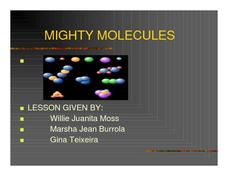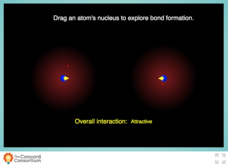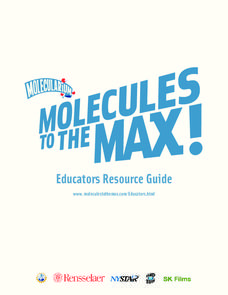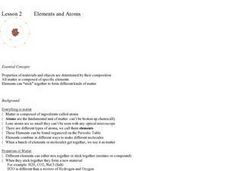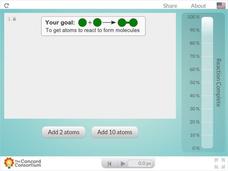Curated OER
Mighty Molecules
Students examine a PowerPoint production on molecules. Then they construct their own molecule and define what an atom, molecule, and matter is. They make a H2, HCI, and an H2O molecule. Finally, a drawing to accompany the actual model is...
Concord Consortium
Forming a Molecule
What does it look like when two atoms bond? Mol-e-COOL! Aspiring chemists observe the interaction between two atoms forming a bond in an easy-to-use interactive. Individuals move atoms closer together and observe changes in attraction...
Curated OER
Atoms and Elements: An Introduction
Students are able to discuss the difference between a proton, a neutron and an electron. They also can explain the difference between an ionic and a covalent bond. Students know the main structure of atoms and molecules. Student are able...
Aquarium of the Pacific
Lego Molecules
Young scientists construct an understanding of molecular compounds in this hands-on science lesson plan. Using LEGO® to model the atoms of different elements, students build molecules based on the chemical formulas of common compounds.
Rensselaer Polytechnic Institute
Molecules to the Max!—Teacher's Discovery Guide
Molecules to the Max! refers to a movie released in 2009 about the world of atoms and molecules. A helpful discovery guide provides five posters on science topics typically covered at the middle school level. It also explains the...
Teach Engineering
Gumdrop Atoms
There's nothing sticky about the resource, unless you count the gumdrops! Scholars create a model of a lithium atom, complete with protons, neutrons, and electrons. It's just that these models are made with gumdrops and toothpicks.
Curated OER
Mass and Moles Worksheet
In this mass and moles worksheet, students solve fifteen problems which include converting between moles, mass, atoms, molecules and formula units.
Rensselaer Polytechnic Institute
Molecules to the Max!—Educators Resource Guide
From molecules to nanotubes, an engaging unit explores the world of tiny science. Fifteen hands-on experiments and lessons engage young scientists as they learn chemistry. Discussions, worksheets, and data analysis reinforce the concepts...
Curated OER
Molecules, Moles and Molar Masses
In this molecules, moles and molar masses learning exercise, students find the atomic masses of 8 elements, they write the formulas for 6 diagrams of molecules and they find the molecular masses of 12 compounds. Students also find the...
Pearson
The Chemical Context of Life
An educational presentation includes atoms, molecules, the four major elements, as well as neutrons and protons. Additionally, slides focus on atomic number, mass number, atomic weight, polar and nonpolar covalent bonding, ionic bonds,...
Concord Consortium
Seeing Intermolecular Attractions
Ahh, the rules of attraction...intermolecular attraction! Introduce your chemistry crew to the other forces that influence the behavior of atoms and molecules alike with a simple interactive. Pupils push and pull polar and non-polar...
Curated OER
Mass-Moles-Particles
In this moles activity, learners define a mole and convert grams to moles or moles to molecules. Students convert specific mass of compounds to moles. This activity has 1 true or false, 6 short answer, 3 fill in the blank, and 15...
Curated OER
Mole Relationships
In this moles learning exercise, learners complete 93 word problems in they calculate the moles, volume, or mass of different molecules.
Curated OER
Elements And Atoms
Students investigate the concept of elements and atoms. They conduct research using a variety of resources and use the information in order to create a class presentation. The activity includes specific dialogue and steps for the teacher...
Curated OER
Bonding
Almost a complete lesson in itself, this presentation will enhance any bonding and compounds unit. The concepts included are charges of atoms lending to particular molecular structures, the stability of bonds and how to diagram them....
Massachusetts Institute of Technology
Lego Atoms and Molecules: Chemical Reactions
Show young chemists what a chemical reaction looks like with two parts of a hands-on experiment. First, learners conduct a wet lab where they observe the reactants (baking soda and calcium chloride, with phenolsulfonphthalein) before,...
Space Awareness
Let's Break the Particles
Build learning by breaking atoms! Young scientists study the way energy changes with a hands-on activity. As they roll steel marbles down a ramp, learners test the hypothesis that kinetic energy does not go away with friction or...
Center for Learning in Action
Introduction to Matter
Begin your states of matter lessons with a demonstration designed to introduce the concept that all matter has properties. Reinforce this concept through vocabulary exploration, and the creation of atom models; salt, water, and carbon...
Curated OER
Moles, Molarity, Grams, and Formula Units
In this atoms activity, learners calculate the number of moles, molarity, grams, or formula units for 20 different problems.
Concord Consortium
Concentration and Reaction Rate
Does concentration affect the rate of a chemical reaction? Science scholars observe and control a chemical reaction in an interactive simulation. The resource allows pupils to add atoms to the reaction vessel and monitor the reaction's...
Columbus City Schools
To Measure its Mass or Volume?
Atoms, elements, and molecules, oh my! Teaching the fundamentals of chemistry to curious sixth graders has never been easier to accomplish. Here is a resource that pulls together everything needed to get them off to a good start,...
Curated OER
WS 4.2 The Mole
In this moles worksheet, learners convert measurements of moles to mass, measurements of mass to moles, measurements of moles to atoms or molecules and measurements of atoms or molecules to moles.
Curated OER
Chemistry of Carbon
After giving basic details about the properties of carbon, some of the common functional groups and molecules are featured. There is some information about specific functions and impact on the human body. The diagrams are helpful and...
Teach Engineering
What is a Nanometer?
Teams learn about the size of a nanometer by measuring objects and converting those measurements. A worksheet then tests the groups' abilities to use nanometers by having them determine the size of objects that are too small to measure.


